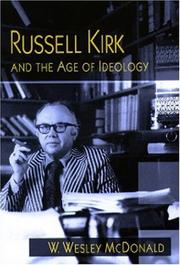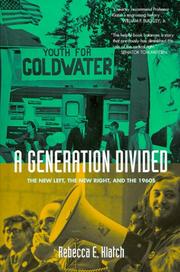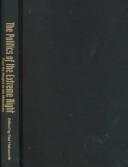| Listing 1 - 10 of 447 | << page >> |
Sort by
|
Book
ISBN: 9781479852697 1479852694 9781479812370 1479812374 Year: 2016 Publisher: New York, NY
Abstract | Keywords | Export | Availability | Bookmark
 Loading...
Loading...Choose an application
- Reference Manager
- EndNote
- RefWorks (Direct export to RefWorks)
The topic of American conservatism is especially timely—and perhaps volatile. Is there what might be termed an “exceptional” form of conservatism that is characteristically American, in contrast to conservatisms found in other countries? Are views that are identified in the United States as conservative necessarily congruent with what political theorists might classify under that label? Or does much American conservatism almost necessarily reflect the distinctly liberal background of American political thought? In American Conservatism, a distinguished group of American political and legal scholars reflect on these crucial questions, unpacking the very nature and development of American conservative thought. They examine both the historical and contemporary realities of arguments offered by self-conscious conservatives in the United States, offering a well-rounded view of the state of this field. In addition to synoptic overviews of the various dimensions of American conservative thought, specific attention is paid to such topics as American constitutionalism, the role of religion and religious institutions, and the particular impact of the late Leo Strauss on American thought and thinkers. Just as American conservatism includes a wide, and sometimes conflicting, group of thinkers, the essays in this volume themselves reflect differing and sometimes controversial assessments of the theorists under discussion.
Book
Year: 2021 Publisher: [Place of publication not identified] : Open Book Publishers,
Abstract | Keywords | Export | Availability | Bookmark
 Loading...
Loading...Choose an application
- Reference Manager
- EndNote
- RefWorks (Direct export to RefWorks)
"Does the creation of artificial reefs benefit subtidal benthic invertebrates? Is the use of organic farming instead of conventional farming beneficial to bat conservation? Does installing wildlife warning reflectors along roads benefit mammal conservation? Does the installation of exclusion and/or escape devices on fishing nets benefit marine and freshwater mammal conservation? What Works in Conservation has been created to provide practitioners with answers to these and many other questions about practical conservation. This book provides an assessment of the effectiveness of 2526 conservation interventions based on summarized scientific evidence. The 2021 edition containssubstantial new material on bat conservation, terrestrial mammal conservation and marine and freshwater mammals, thus completing the evidence for all mammal species categories. Other chapters cover practical global conservation of primates, amphibians, bats, birds, forests, peatlands, subtidal benthic invertebrates, shrublands and heathlands, as well as the conservation of European farmland biodiversity and some aspects of enhancing natural pest control, enhancing soil fertility, management of captive animals and control of freshwater invasive species. It contains key results from the summarized evidence for each conservation intervention and an assessment of the effectiveness of each by international expert panels. The accompanying website www.conservationevidence.com describes each of the studies individually, and provides full references. This is the sixth author-approved edition of What Works in Conservation, which is revised on an annual basis."
Book
ISBN: 3838270231 Year: 2018 Publisher: Stuttgart : Ibidem-Verlag,
Abstract | Keywords | Export | Availability | Bookmark
 Loading...
Loading...Choose an application
- Reference Manager
- EndNote
- RefWorks (Direct export to RefWorks)
Book
ISBN: 0190252553 1283232251 9786613232250 019979393X 9780199793938 9781283232258 9780199793747 0199793743 9780190252557 6613232254 0199911886 9780199911882 Year: 2011 Publisher: Oxford ; New York : Oxford University Press,
Abstract | Keywords | Export | Availability | Bookmark
 Loading...
Loading...Choose an application
- Reference Manager
- EndNote
- RefWorks (Direct export to RefWorks)
Late in life, William F. Buckley made a confession to Corey Robin. Capitalism is ""boring,"" said the founding father of the American right. ""Devoting your life to it,"" as conservatives do, ""is horrifying if only because it's so repetitious. It's like sex."" With this unlikely conversation began Robin's decade-long foray into the conservative mind. What is conservatism, and what's truly at stake for its proponents? If capitalism bores them, what excites them? Tracing conservatism back to its roots in the reaction against the French Revolution, Robin argues that the right is fundamentally in
Conservatism --- History.

ISBN: 0826262589 9780826262585 0826215122 9780826215123 0826215122 9780826215123 Year: 2004 Publisher: Columbia, Mo. University of Missouri Press
Abstract | Keywords | Export | Availability | Bookmark
 Loading...
Loading...Choose an application
- Reference Manager
- EndNote
- RefWorks (Direct export to RefWorks)
Conservatism --- History --- Kirk, Russell.
Book
ISBN: 1536112321 9781536112320 9781616680251 1616680253 Year: 2010 Publisher: New York
Abstract | Keywords | Export | Availability | Bookmark
 Loading...
Loading...Choose an application
- Reference Manager
- EndNote
- RefWorks (Direct export to RefWorks)
Conservatism --- Japan --- Foreign relations

ISBN: 0585323968 0520922344 9780520922341 9780585323961 0520217144 0520217136 Year: 1999 Publisher: Berkeley University of California Press
Abstract | Keywords | Export | Availability | Bookmark
 Loading...
Loading...Choose an application
- Reference Manager
- EndNote
- RefWorks (Direct export to RefWorks)
The 1960s was not just an era of civil rights, anti-war protest women's liberation and rock festivals. This text examines the generation that came into political consciousness during the 1960s, telling the story of the New Right and New Left.
Conservatism --- New Left
Book
ISBN: 1498270662 9781498270663 Year: 2015 Publisher: Eugene, OR
Abstract | Keywords | Export | Availability | Bookmark
 Loading...
Loading...Choose an application
- Reference Manager
- EndNote
- RefWorks (Direct export to RefWorks)
Bill Kauffman has carved out an idiosyncratic identity quite unlike any other American writer. Praised by the likes of Gore Vidal, Benjamin Schwarz, and George McGovern, he has, with a distinctive and slashingly witty, learnedly allusive style, illumed forgotten corners of American history, articulated a defiant and passionate localism, and written with love and dark humor of his repatriation. Poetry Night at the Ballpark gathers the best of Bill Kauffman's essays and journalism in defense and explication of his alternative America--or Americas. Its discrete pieces are bound by a thematic unity and propulsive energy and are full of unexpected (yet startlingly apposite) connections and revelatory linkages. Whether he's writing about conservative Beats, backyard astronomers, pacifist West Pointers, or Middle America in the movies, Bill Kauffman will challenge, maybe even change, the way you look at American politics and the American provinces. About Bill Kauffman and his Writings: ""Inspiriting and restorative . . . "" --Edward Abbey, author of Desert Solitaire ""Kauffman and I are the original patriots. . . . Kauffman is a romantic reactionary, a writer with an odd, energetic optimism."" --Gore Vidal, author of Burr ""I've admired Bill Kauffman's books for years . . . appealing, elegantly written, and entirely American."" --Howard Frank Mosher, author of Northern Borders ""Bill Kauffman is a conservative of the highest order, unlike the false brand now conducting our political affairs."" --George McGovern+, 1972 Democratic candidate for President ""Kauffman thinks and feels as a man fully awake; he writes like a dream."" --Thomas Mallon, author of Watergate ""Generous in spirit . . . "" --Christopher Hitchens, author of Hitch 22 ""Bill Kauffman is one of America's funniest and wisest writers. Not only can he make anarchism seem lovable, he forces you to reassess everything you believe about American politics and culture. He might even make you change your life."" --Tom Bissell, author of The Father of All Things Bill Kauffman is the author of ten previous books, including Dispatches from the Muckdog Gazette, which won the 2003 national ""Sense of Place"" award from Writers & Books, and Look Homeward, America, which the American Library Association named one of the best books of 2006. He also wrote the screenplay for the feature film Copperhead (2013). Kauffman and his family live in his native Genesee County, New York.
Conservatism --- Populism --- Social problems

ISBN: 1474290965 1474290973 9781474290968 9781855674585 1855674580 Year: 2018 Publisher: London : Bloomsbury Publishing,
Abstract | Keywords | Export | Availability | Bookmark
 Loading...
Loading...Choose an application
- Reference Manager
- EndNote
- RefWorks (Direct export to RefWorks)
"Fascist, authoritarian, anti-Semitic and extremist movements made a powerful and devastating contribution to the 20th century. While the experiences of the 1930s and 1940s served to delegitimise such forces, contemporary Europe and the USA have witnessed the resurgence of extreme right-wing politics. Rapid socio-economic change, the appeal of nationalism, the failures of mainstream political parties and intense campaigning around issues such as immigration, security and unemployment have all fuelled the phenomenon. This book, a sequel to The Extreme Right in Europe and the USA, provides a comprehensive and analysis of the nature and prevalence of extreme right movements in Europe - both West and East - and in the USA at the turn of the millennium. The authors reveal the uneven process of extreme right-wing revival, which has varied from country to country depending on specific political cultures and circumstances, with some movements confined to the margins while others have moved towards the political mainstream. They examine the ideas, policies, personalities, organizations, voters and reasons for the success of extreme right-wing movements in a range of countries, as well as providing a more general examination of the nature and politics of the extreme right."--Bloomsbury Publishing.
Book
ISBN: 9781400868230 1400868238 0691644381 9780691644387 Year: 2015 Publisher: Princeton, NJ
Abstract | Keywords | Export | Availability | Bookmark
 Loading...
Loading...Choose an application
- Reference Manager
- EndNote
- RefWorks (Direct export to RefWorks)
Although Conservative parties did not exist in Germany until after the Napoleonic Wars, there did emerge, around 1770, traceable organized political activity and intellectual currents of a clearly Conservative character. The author argues that this movement developed as a response to the challenge of the Enlightenment in the fields of religion, socioeconomic affairs, and politics- and that this response antedated the impact of the French Revolution. Believing that Conservatism cannot be treated properly as a specialized phenomenon, or simply as an intellectual movement, Professor Epstein correlates it with the political and social forces of the time.Originally published in 1966.The Princeton Legacy Library uses the latest print-on-demand technology to again make available previously out-of-print books from the distinguished backlist of Princeton University Press. These editions preserve the original texts of these important books while presenting them in durable paperback and hardcover editions. The goal of the Princeton Legacy Library is to vastly increase access to the rich scholarly heritage found in the thousands of books published by Princeton University Press since its founding in 1905.
Conservatism --- Germany --- Intellectual life.
| Listing 1 - 10 of 447 | << page >> |
Sort by
|

 Search
Search Feedback
Feedback About UniCat
About UniCat  Help
Help News
News